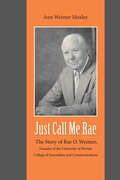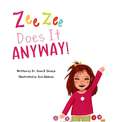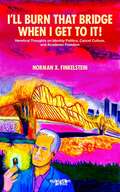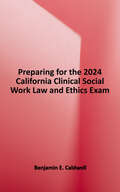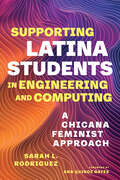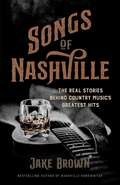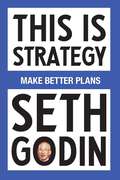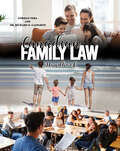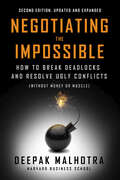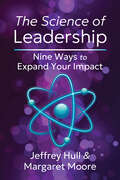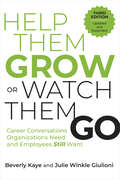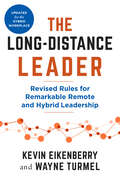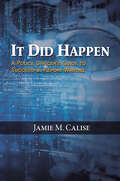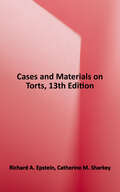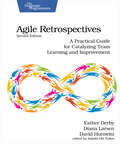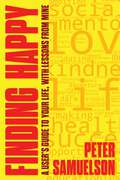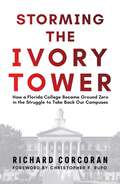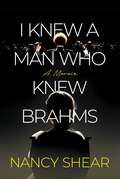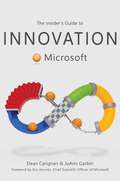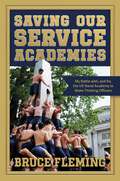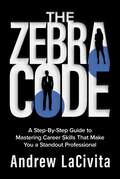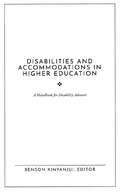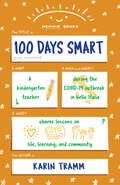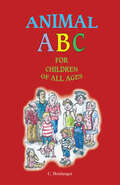- Table View
- List View
Just Call Me Rae: The Story of Rae O. Weimer, Founder of the University of Florida College of Journalism and Communications
by Ann Weimer MoxleyDistributed on behalf of the University of Florida College of Journalism and CommunicationsRae O. Weimer founded the University of Florida’s first school of journalism, and within one year of his arrival in Gainesville, the school received accreditation. No longer would Florida’s students have to leave the state to pursue dreams of becoming journalists. Just Call Me Rae chronicles the life of the man who pioneered journalism education in Florida and built one of the most innovative journalism and communications programs in the country. Rae grew up in a small Midwestern town where he learned to be resourceful and hardworking, traits that would make him—along with his reputation—the prime candidate to lead UF’s small journalism department. Due to economic hardship, he dropped out of college in his final year, but he knew he was destined to be a newspaperman. He learned everything he could about the profession, taking any job that came his way. Between 1925 and 1940, Rae worked for eleven newspapers in six states, including the Akron Beacon Journal and Cleveland Press in Ohio and the Buffalo Times in New York. The culmination of his newspaper career was his role at the revolutionary and historic PM newspaper in New York City. At PM, Rae rubbed elbows with some of the greatest journalists and writers of his generation, including Dorothy Parker, Ernest Hemingway, Ted Geisel (Dr. Seuss), Max Lerner, I. F. “Izzy” Stone, Dashiell Hammett, and Pulitzer Prize-winner Edna Ferber. Rae’s reputation ran ahead of him to Florida, where the state’s newspapers were agitating for upgrading journalism education at UF. Rae might not have had the degrees that other candidates had, but he had the credentials—he was a seasoned newspaperman, a trained newspaper technician, and his years at PM had honed his teaching instinct. UF President J. Hillis Miller agreed to hire Rae, and so would begin the legend of the degreeless dean. Rae re-envisioned journalism at the University of Florida. With his leadership, what had been a three-person department that rarely exceeded twenty students grew into the School of Journalism. He expanded the school to include advertising and radio and television journalism in the curriculum, and by the 1960s UF's School of Journalism was the fastest growing journalism program in the country. In 1968, shortly after Rae retired, the School became the College of Journalism and Communications, and today it is still ranked among the nation’s top journalism programs, with students hired at news organizations across the country, including highly competitive newsrooms in New York, Washington, D.C., Chicago, and Los Angeles. With the communication skills they developed at the college, many pursue careers in public service, politics, law and public relations. This book is an eye-opening chronicle of Rae Weimer’s lasting legacy to journalism in the state of Florida.Distributed by University Press of Florida on behalf of the University of Florida College of Journalism and Communications
Zee Zee Does it Anyway: A Story About Down Syndrome And Determination
by Dr Vona B. ShodjaZee Zee Does It Anyway is a story about a determined girl who happens to have Down syndrome. But does she let that stop her? No way! First, she introduces readers to the meaning of Down syndrome, and how it is not anything to fear. It is easy to fall in love with her fun-loving personality as she proves that even though her disability makes her seem different from other kids her age, she is actually quite a bit like them. She describes her favorite foods, participates in her hobbies, and declares her goals and dreams. Readers will learn that, just like other kids, with a little help from a few special people, Zee Zee can do anything she sets her mind to!
I'll Burn That Bridge When I Get to It!: Heretical Thoughts on Identity Politics, Cancel Culture, and Academic Freedom
by Norman FinkelsteinNorman Finkelstein first made his name while still in graduate school when he exposed an acclaimed national bestseller as a hoax. He went on in subsequent decades to subject Israel's apologists as well as Holocaust hucksters to withering scrutiny. In his new book, Finkelstein focuses his keen forensic eye on the canonical texts of identity politics. After methodically parsing them, Finkelstein concludes that they're lacking in intellectual substance. Instead, the real purpose of identity politics is to derail a class-based-movement bent on radical change. In a long, scathing chapter, Finkelstein analyzes the cult surrounding Barack Obama, which he reveals as the ultimate product of identity politics. The first Black president rose to power by having, in Obama's own cynical words, "pulled off a neat trick" by standing for nothing except his skin color. If '"woke" liberals embraced him, it was because, beneath his hip veneer, Obama was a sure bet to prop up the corrupt status quo. Along the way, Finkelstein recalls his own life in radical politics and his close encounters with cancel culture, which left him unemployed and unemployable. He situates his personal story within broader debates on academic freedom and poignantly concludes that, although occasionally bitter, he harbors no regrets about the choices he made. "If I can't laugh, I don't want your revolution," Finkelstein declares. Readers of this book, laced with his signature wit, will get to laugh along with him.
Preparing for the 2024 California Clinical Social Work Law & Ethics Exam
by Benjamin E. CaldwellPrepare yourself effectively for the California LCSW Law & Ethics Exam with the leading study guide. With a summary of key knowledge, practice exams (one full-length and one mini) with rationales, test-taking strategy, and anxiety management, this book is the test prep you need to help you succeed. Updated to 2024 state law, including changes in elder and dependent adult abuse reporting, involuntary hospitalization, conservatorship, privileged communications, and more. 20 of the 100+ total practice questions are new to this edition.
Knee Ability Zero
by Ben PatrickKnee Ability Zero is not a medical book, rather: it is a step-by-step manual which allows you to find and improve your pain-free ability, and this has resulted in over 2000 knee success stories for people of all ages and walks of life.Over 8 steps we build "from the ground up" - from your ankles to lower legs to knees to thighs to hips, improving the strength, control, and freedom you have over your body, with explanation of why each step helps your knees. The 8 steps take 15-20 minutes in total, and I suggest doing them up to 3 times per week.You do not need any weights, equipment, or special abilities for this program, and you can start applying Step 1 from the moment you open up the book!
Supporting Latina Students in Engineering and Computing: A Chicana Feminist Approach
by Sarah L. RodriguezResearch-based strategies for creating inclusive higher education spaces that encourage Latina student success in engineering and computer science
Songs of Nashville: The Real Stories Behind Country Music's Greatest Hits
by Jake Brown"Jake Brown puts the songwriter in the spotlight." —Billboard Country Here are the untold stories behind country&’s most influential songs from the tunesmiths themselves—featuring interviews with Jelly Roll, Taylor Swift cowriters Liz Rose and Lori McKenna, Luke Combs cowriter Drew Parker, Morgan Wallen hit writer Josh Thompson, chart-toppers Clint Black and Vince Gill, legends and trendsetters like the late Merle Haggard and Kinky Friedman, Americana troubadour Jim Lauderdale, and song crafters with scores in film and television like A Star Is Born Oscar nominees Hillary Lindsey and Natalie Hemby and Songland judge Shane McAnally.Songs of Nashville is a look inside the lives and work of the artists who&’ve shaped Nashville and the sound of country. It reveals the emotional fuel, melodic and lyrical science, and pure magic of the Music Row hitmaking machine. Through in-depth profiles and conversations, country artists reveal the birth stories of the songs you know and love—and some you may not, but you definitely should!—from spontaneous moments of inspiration to the chemistry of collaboration. Songs of Nashville is a must-read to discover the secrets of the creative process and the enduring power of storytelling that makes country music timeless.
This Is Strategy: Make Better Plans (Create a Strategy to Elevate Your Career, Community & Life)
by Seth GodinA Best Non-Fiction Book of 2024 from The Next Big Idea Book Club and National Bestseller. From Seth Godin, one of the world's most influential business thinkers and bestselling author of This is Marketing, comes an essential guide to thinking strategically in a complex, ever-changing world."With his signature clarity and brevity, the marketing maven presents memorable, practical advice for making smarter plans." —Adam Grant, author of Think Again In this unique and thought-provoking book, Godin shares insights on strategy through a series of powerful reflections and observations that will reshape how you approach problems, make decisions, and create change. &“Creating tomorrow by repeating yesterday is not a useful way forward.&” &“Every strategy requires choice. And those choices often involve saying &‘no&’ to things we could do, but won&’t do.&” &“It&’s not easy to persuade someone to want what you want. It&’s much more productive to find people who already want to go where you&’d like to take them.&” This is Strategy is a modern classic that offers perspectives you'll find yourself returning to again and again. Rather than providing step-by-step formulas, Godin offers something more valuable: a new way of seeing and thinking about the challenges you face. You&’ll discover how to: - Identify your "smallest viable audience" and make remarkable work they can't ignore - Understand and influence the systems shaping our world - Prioritize long-term thinking over instant gratification - Make smart, purposeful choices that shape a better tomorrow Who this book is for: - Leaders who want to think more deeply about their impact - Entrepreneurs tired of conventional business advice - Change-makers seeking lasting transformation in their career and community - Anyone feeling stuck in outdated systems and looking for a fresh perspective Strategy turns our effort into impact. Your journey to better thinking starts here.
Canadian Family Law Handbook
by Norman FeraThis book provides an easy-to-understand survey of family law across Canada. For those interested in Ontario or other provinces, perhaps working toward paralegal certification, this book provides all the relevant details of family law and competencies in an organized fashion using plain language. The latest amendments to the Divorce Act concerning decision-making responsibilities, parenting time, and contact orders are fully canvassed as are new requirements for moving or relocating, and the broader definition of family violence. Indeed, not all marriages and families are harmonious. There is a thorough review of domestic abuse and resulting trauma as well as legal remedies including peace bonds, restraining orders, and civil contempt. This book also examines the client-centered, trauma-informed, anti-racist approach to providing legal services.The laws of marriage (but not solemnization), annulment, and divorce are essentially the same no matter where you live in Canada. The first six chapters are very informative about those topics and issues of parenting, child support, and financial assistance for spouses. This book also deals with disputes concerning parenting responsibilities, support, and property division that arise when the parties never married but cohabited in a conjugal relationship of some duration prior to separation.While this book is not legal advice, it provides every reader with a solid grasp of their rights and obligations in family matters. And those who will qualify as legal advisers in family disputes will benefit from the breadth of the material and the comparative approach.
Negotiating the Impossible, Second Edition: How to Break Deadlocks and Resolve Ugly Conflicts (without Money or Muscle)
by Deepak MalhotraAward-winning professor from Harvard Business School offers a new and improved edition of his guide to navigating negotiation deadlock, while offering practical advice and stories of success.Updated with 20% new material, including a brand-new chapter and discussion guide.Harvard professor and negotiation adviser Deepak Malhotra shows how to defuse even the most potentially explosive situations and to find success when things seem impossible in this fully expanded upon second edition.Some negotiations are easy. Others are more difficult. And then there are situations that seem completely hopeless. Malhotra identifies three broad approaches for breaking deadlocks and resolving conflicts, and draws out scores of actionable lessons using behind-the-scenes stories of fascinating real-life negotiations, including:• drafting of the US Constitution• ending bitter disputes in the NFL and NHL• and beating the odds in complex business situations.He also shows how these same principles and tactics can be applied in everyday life, whether in a job interview or even negotiating with children. Brand new to this edition is a chapter on challenges facing today's world including how to effectively negotiate in virtual spaces, incorporate AI in your toolkit, and tackle increased polarization.With conflict escalating and no one willing to back down, Malhotra reminds us that negotiation is always, fundamentally, about human interaction. No matter how high the stakes the object of negotiation is to engage with other human beings in a way that leads to better understandings and agreements. The principles and strategies in this book will help you do this more effectively in every situation.
The Science of Leadership: Nine Ways to Expand Your Impact
by Margaret Moore Jeffrey HullAt last, everyday leaders can put the science of leadership into action every day to model, inspire, and empower others to perform at their best.The Science of Leadership: Nine Ways to Expand Your Impact presents a game-changing synthesis of 50 years of leadership research as a comprehensive guide for seasoned and aspiring leaders, and anyone who wants to help their boss become a better leader.Authors Jeffrey Hull and Margaret Moore, leadership coaches and leaders of the Institute of Coaching, translate academic research and their extensive experience in leading and coaching into a practical, self-coaching roadmap for your own growth in these times of exponential change and disruption.This book organizes the science of leadership (15,000+ studies and articles showing what improves individual, team, and organizational performance) into nine capacities which build upon each other. Each capacity is brought to life by real-life stories, a science overview, practices, and ways to deal with overuse. These capacities are organized into three levels with increasing complexity:Self-Oriented1. Conscious - See clearly, including myself2. Authentic - Care3. Agile - FlexOther-Oriented4. Relational - Help5. Positive - Strengthen6. Compassionate - ResonateSystem-Oriented (team and organization)7. Shared - Share8. Servant - Serve9. Transformational - TransformWhether you're a C-suite executive, an emerging leader, or a professional coach or consultant, The Science of Leadership delivers the fundamentals you need to know. You will quiet your ego and feel more fulfilled as a leader as your impact grows. Leading will feel more like flying than trudging uphill, with more ease, less strain, and more pleasure.
Help Them Grow or Watch Them Go, Third Edition: Career Conversations Organizations Need and Employees Still Want
by Beverly Kaye Julie Winkle GiulioniThis new edition of the bestselling employee development classic includes advice on engagement and retention in today's more flexible employment environment, a new chapter on remote and hybrid work, and a deeper discussion of career development in your organization.Study after study confirms that career development is the single most powerful tool managers have for driving retention, engagement, productivity, and results. But most managers feel they just don't have time for it. This book offers a better way: frequent, short conversations with employees about themselves, their goals, and the business that can be integrated seamlessly into the normal course of business.Beverly Kaye and Julie Winkle Giulioni identify three broad types of conversations that will increase employees' awareness of their strengths, weaknesses, and interests; and point out where their organization and their industry are headed. The authors provide new assessments, worksheets, and a discussion guide to help employees and managers pull all of that together to create forward momentum. The accompanying AI Bookbot enhances this experience by offering real-time guidance, conversation prompts, and personalized insights based on the book's proven methodologies.
The Long-Distance Leader, Second Edition: Revised Rules for Remarkable Remote and Hybrid Leadership (The Long-Distance Worklife Series)
by Kevin Eikenberry Wayne TurmelThe new edition of this internationally acclaimed guide to remote and hybrid leadership comes with an updated and enriched framework for the modern workplace. It introduces new principles and retains proven strategies for effective leadership across distances.When The Long-Distance Leader was first published, it was pre-pandemic and remote work was in its infancy with 30% of managers leading at a distance—now that number is well over 50%.As more organizations adopt a remote workforce, the challenges of leading at a distance become more urgent than ever. The cofounders of the Remote Leadership Institute, Kevin Eikenberry and Wayne Turmel, show leaders how to guide their teams by recalling the foundational principles of leadership whether their teams are remote, hybrid, co-working, or something entirely new!The authors' "Three-O" Model refocuses leaders to think about outcomes, others, and ourselves—elements of leadership that remain unchanged, whether employees are down the hall or halfway around the world. By pairing it with the Remote Leadership Model, which emphasizes using technology as a tool and not a distraction, leaders can navigate the terrain of managing teams wherever they are.This second edition features updated exercises that ensure projects stay on track, keep productivity and morale high, and build lasting relationships, along with a new chapter on hybrid workplaces.
It Did Happen: A Police Officer&’s Guide to Successful Report Writing
by Jamie M. Calise&“If it&’s not in the report, it didn&’t happen.&” This law enforcement adage has stood the test of time for a reason.With calls for greater transparency in the criminal justice system and technology revolutionizing how information is shared, police reports have taken on new life in today&’s law enforcement world. For most new officers, learning how to write a report starts with learning what to write. Make no mistake, a quality investigation is the foundation of a successful police report.By exploring the critical interplay between investigating and writing, It Did Happen: A Police Officer&’s Guide to Successful Report Writing examines case development and narrative construction from the ground up. As it does, it analyzes different categories of police reports and reviews the legal standards and procedural rules that officers regularly encounter. Along the way, it contrasts mandatory and discretionary reporting and discusses how computer-aided dispatch systems can serve as valuable investigative resources. Finally, this book recognizes that police reports are the foremost tool for communicating the facts and circumstances that guide an officer&’s decisions.Whether you attend the police academy, take a criminal justice course, or work in the security field, this book offers several strategies to enhance your report writing skills.
Cases and Materials on Torts: [connected Ebook With Study Center] (Aspen Casebook Ser.)
by Richard A. Epstein Catherine M. Sharkey"Casebook on Tort Law for law students"-Provided by publisher.
Agile Retrospectives, Second Edition
by David Horowitz Esther Derby Diana LarsenIn an uncertain and complex world, learning is more important than ever before. In fact, it can be a competitive advantage. Teams and organizations that learn rapidly deliver greater customer value faster and more reliably. Furthermore, those teams are more engaged, more productive, and more satisfied. The most effective way to enable teams to learn is by holding regular retrospectives. Unfortunately, many teams only get shallow results from their retrospectives. This book is filled with practical advice, techniques, and real-life examples that will take retrospectives to the next level--whether your team is co-located, hybrid, or remote. This book will help team leads, scrum masters, and coaches engage their teams to learn, improve, and deliver greater results. For nearly two decades, scrum masters, team leads, and coaches have relied on the first edition of Agile Retrospectivesas an essential resource to facilitate better retrospectives. This edition builds on recent research, reflects the authors' experiences over two decades, and shares wisdom gleaned from the global retrospective community. Find practical advice to level up retrospective skills. Address the challenges of remote and hybrid retrospectives head on. Take advantage of expanded guidance on designing and facilitating retrospectives--based on the questions and concerns of practitioners worldwide. Gain insight into choosing a broad or narrow focus for retrospectives. Explore how to use both objective and subjective data to enable more effective conversations. Learn how to make decisions that stick. Understand the importance of psychological safety and how to foster it in retrospectives. Elevate issues and engage managers in systemic change. Learn from many real-life stories that demonstrate how our advice has impacted retrospectives at organizations around the globe. Finally, find a set of recommended flows that reveal the authors' thought process in designing retrospectives for scenarios teams faced in real life.
Finding Happy: A User's Guide to Your Life, with Lessons from Mine
by Peter SamuelsonA master class for every Gen Z and Millennial to Find Happy in a dizzying worldAlmost everyone looks back on their youth and thinks, &“I wish I knew then what I know now.…&” This is a book for young adults who want to know right now what it is so many wish they had known back then. What is happy, anyway? Where do you find it? Finding Happy is for young adults starting their adult journey, and for those well into theirs who have not yet sighted land. It is written by a master storyteller who learned to scale walls and blew them up rather than be stopped, and who learned in the process that our happiness flows from leaving the world a better place than we found it. Ultimately, it&’s about how best to channel this glorious life we are each privileged to enjoy and to make it truly happy. Finding Happy is filled with gripping adventures and misadventures that demonstrate just how possible the seemingly impossible often is, from daredevil filmmaking in Africa and Asia to making daunting rules work for you, to earning a full college scholarship after being completely unable to answer the entrance exam essay question…to climbing down a hundred-foot pipe shaft at 3 a.m. to rescue a kitten, with no plan for how to climb back up. It is about how best to seize the day, which risks are brave and which foolish, about roadblocks and solutions, learning from leaders and finding your own secret sauce. Samuelson explains how to find your compass and persuade others to help you. He shows how to live your passion, make a living, take off your mask, build your best place in the universe, and find your own unique and personal Happy.
Storming the Ivory Tower: How a Florida College Became Ground Zero in the Struggle to Take Back Our Campuses
by Richard CorcoranA firsthand account of how Richard Corcoran, former education commissioner of Florida, successfully took on powerful progressive interest groups, broke their monopoly, and paved the way for higher education reform across America.Covid alerted the nation to the reality that K-12 schools—private and public alike—were infested with ideologues bent on indoctrinating children. Then, three years after the beginning of the pandemic, the shocking response to Hamas&’s genocidal assault on Israel made Americans aware that the same tumor had wholly sickened our country&’s colleges and universities. Now, conservatives—and increasingly, moderates and old-school liberals—want to know exactly how the radical left captured higher education. Florida has been the vanguard in the war to restore sanity to higher education. And Richard Corcoran has been one of its commanding generals—and racking up wins. When Corcoran was Florida&’s education commissioner, he was the point person for reopening schools and banning mask mandates. He triumphed. Then, he was given a herculean task: remaking a college overrun by radicalism and cancel culture. In 2023, he moved into the president&’s office in Sarasota, took on a campus mob, and challenged a media firestorm. Just a year later, Corcoran achieved the seemingly impossible. He turned around New College of Florida. Now, free speech is protected. Violence and anti-Semitism are abolished. DEI bureaucracy is eliminated. And, already, enrollment records are being broken. Storming the Ivory Tower is the story of how Corcoran is winning the fight for freedom in hostile territory, and how others can join the battle.
I Knew a Man Who Knew Brahms
by Nancy ShearA vivid personal account of a Golden Age in classical music—the second half of the 20th century—providing a rare, behind-the-scenes view of the inner workings of a top symphony orchestra.Nancy Shear was only fifteen when she began sneaking into Philadelphia Orchestra concerts through the stage door, and seventeen when she was hired as a member of the orchestra&’s library staff to help prepare the music; one year later, she became Leopold Stokowski&’s musical assistant. Being young and female, she was a pioneer in both positions. I Knew a Man Who Knew Brahms takes readers into the homes, studios, and minds of legendary artists with whom Shear shared close personal relationships, including Stokowski, Mstislav Rostropovich, Eugene Ormandy, and members of the Philadelphia Orchestra. Many of these brilliant and talented artists were also outrageous, egocentric, and tyrannical. Throughout this book, Shear topples more than a few revered musicians from their podiums and their pedestals. A literary welcome mat to the beautiful world of classical music, this memoir is accessible and engaging for all. It brings readers into rehearsals and concert halls, revealing the choices musicians must consider, and what conductors, players, and composers really do. A heartwarming story about passion, determination, and survival, I Knew a Man Who Knew Brahms explores music at its core. No reader will ever listen to music the same way again.
The Insider's Guide to Innovation at Microsoft
by Dean Carignan JoAnn GarbinIn this unique guide, you&’re not just reading about innovation—you're learning how to do it from the people behind some of the biggest breakthroughs of the last 50 years at one of the most influential and valuable companies in the world.Are there innovation truisms that hold from one initiative to the next? Are there strategies that appear again and again in the success stories of businesses as varied as gaming and cloud infrastructure? Are there behaviors common to creative leadership in every role, from research to sales? And if these patterns exist, could they be distilled into teachable practices? These are the questions Dean Carignan and JoAnn Garbin, two senior innovation leaders at Microsoft, set out to answer. The Insider&’s Guide to Innovation at Microsoft reveals the patterns behind Microsoft&’s biggest wins and losses—from the Xbox revolution to the Windows Mobile miss and the unexpected rise of Bing in AI. Based on dozens of interviews only fellow &“Microsofties&” could secure, this book shares behind-the-scenes stories brimming with insights and proven practices that transcend time and technology.
Saving Our Service Academies: My Battle with, and for, the US Naval Academy to Make Thinking Officers
by Bruce FlemingOnce proud citadels of virtue, the US military academies have lost their way and are running on fumes. They need to be fixed before it&’s too late.Saving Our Service Academies covers one man&’s unrelenting thirty-year fight with the military bureaucracy to instill qualities of force and thoughtfulness in officers-to-be, to show young men how to be adults with other men and women, and to show young women how to deal with the men. Bruce Fleming has spent over thirty years teaching midshipmen and future officers at the US Naval Academy in Annapolis. This position was both a dream job and a nightmare for the enthusiastic, athletic, young Fleming. He found, in the thousands of midshipmen he taught, mentored, and exercised with for three decades, a heartbreaking waste of potential, as promising officers-to-be lapsed into apathy and cynicism because of the dispiriting reality behind the gleaming facade of the Naval Academy. What happened to duty, honor, and country at Annapolis? These values have disappeared in the wake of changes in the world, such as the rise of ROTC and the increase in expense of civilian colleges (the service academies are free to the students), and in the attempt to use the service academies as experiments in trendy social engineering. A staunch advocate for military strength, Fleming shows how the smoke and mirrors of service academies produce officers who are taught to say &“SIR, YES SIR&” rather than to have the guts to say things their commanding officer doesn&’t want to hear. Is that why the US hasn&’t won a war since World War II? By writing op-eds about the waste, fraud, and abuse of government (and taxpayer) money, Fleming put a target on his back that the USNA administration used to fire him in 2018, despite being a tenured civilian professor. He was reinstated by a federal judge in 2019. The service academies are government programs that no longer fill the needs for which they were created, and so like all government programs, can be re-examined. Indeed, as Fleming argues, they teach blind obedience in officers rather than informed and respectful questioning, and so sap our military strength rather than increasing it. They need to be re-imagined not as stand-alone undergraduate institutions that wall off future officers in an increasingly untenable isolation from the country they are to defend, but either be combined with the officer commissioning sources that currently produce over 80 percent of our new officers, or re-purposed to post-civilian college training institutions.
The Zebra Code: A Step-By-Step Guide to Mastering Career Skills That Make You a Standout Professional
by Andrew LaCivitaAchieve remarkable growth and fulfillment through The Zebra Code—a transformative roadmap of skills, lessons, and actionable wisdom designed to keep you on a path of constant career advancement.Have you ever found yourself lost in the maze of professional growth? Have you ever felt stuck, unsure of which skills to prioritize or how to chart your career path effectively? These are common challenges many people face and result in unrealized potential and missed opportunities.The Zebra Code is your answer. In a post-academic world, where traditional guidance is scarce and you&’re left to figure it out on our own, this book becomes your experienced mentor. The Zebra Code offers a structured syllabus of the most impactful, professional skills and sequenced lessons to help navigate the intricacies of career development. No more wandering aimlessly only to blend in with the herd. Now, you can craft and implement your own personalized, effective, strategic, career growth plan to stand out and get ahead.Imagine a future where your career aligns perfectly with your abilities—where you consistently achieve success and satisfaction. It's within your grasp, and it starts with The Zebra Code!
Disabilities and Accommodations in Higher Education: A Handbook For Disability Advisors
by Benson KinyanjuiDISABILITIES AND ACCOMMODATIONS IN HIGHER EDUCATION: A HANDBOOK FOR DISABILITY ADVISORS
100 Days Smart: A kindergarten teacher shares lessons on life, learning, and community during the COVID-19 outbreak in bella Italia
by Karin TrammKarin Tramm’s kindergarten class at DoDEA Vicenza Elementary School on Caserma Ederle Army Base, Italy, was counting up to a magic day—the 100th day of school—when students would be 100 days smart!“Mrs. Tramm, is that the last day of school?” a child asked."Goodness no, there are a lot of numbers bigger than one hundred,” Mrs. Tramm explained, “and we will be in school for many more days after the hundredth day.”But then, on February 21, 2020, the 100th day of school, COVID-19 changed everything. From empty classrooms to kindergarten in the kitchen, teachers, parents, and students navigated uncharted waters as their world locked down in the epicenter of the Italian outbreak. For the next 100 days, residents of Vicenza learned to find joy in simplicity, country living, and community.In diary form, 100 Days Smart highlights their resilience, recognizing and remembering the fears and frustrations, humor and humanity of shared experiences on a new path forward.
Animal ABC for Children of All Ages
by C. BoulangerWhen COVID-19 lockdowns swept the globe, creativity unlocked for one woman in Belleville, Ontario. Alone with her cat, C. Boulanger turned to a fantasy world she had long imagined, bringing to life a charming children&’s tale. With whimsical animals as guides straight from her isolation, she penned Animal ABC for Children of All Ages not just to delight young readers, but to remind all of us that even in the darkest of days, joy and wonder still exist if only we know where to look. Brighten your family&’s time at home with this playful journey of imagination.Cover designed by Janet Eastwood.
